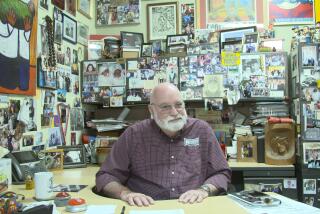People Are Back in the Equation
This election marks a turning point in Los Angeles history: It is the beginning of the last term for the mayor, the city attorney, the controller and half the members of the City Council. Because so many incumbents have held office for so long, it is also the last election in which the “old guard”--or at least the remnants of the coalition that existed in Los Angeles for so many years--still survives.
Next time, ethnic competition will probably reassert itself, especially in the districts that are becoming more and more ethnically mixed. Given the vote on the school bond issue, Latinos surpassed expectations and appear to be poised to come into their own, especially where children’s issues are concerned. Once they begin voting, they are very likely to continue and grow a stronger with each election.
But the most interesting and perhaps most surprising lesson about the 1997 election is the competition for the charter commission. The 52 candidates who put themselves forward, trying out the role of public official, showed an interest and vitality missing from the bigger races. Even with the mayor’s half a million dollars, this was a grass-roots effort where money was not the be all and end all of the campaign and, at this point, the mayor will not control the elected commission.
One reason Los Angeles has a lackadaisical political tradition is because there are so few political offices available to run for. The school board districts are huge, and the City Council districts rival congressional districts in size. While the charter reform commission has a rather murky history growing out of a dispute between the mayor and the council--and is not all that it is cracked up to be in terms of bringing democracy to the voters when compared to the commission appointed by elected officials who can be held accountable--the race brought out something we didn’t know existed in Los Angeles: real interests that reflected the concerns of everyday Angelenos.
Advocates of term limits argue that change in office awakens voter interest. Unfortunately, the Los Angeles experience suggests that once elected, public officials will stay there until the full measure of their terms because no one will bother running against them, knowing they will be out of office in the next election. That’s why Tom Hayden had such a clear field to challenge the mayor. There are other serious and interested Los Angeles politicians who want to be mayor, but they chose to wait Riordan out. It was not his popularity, nor even his money. It was just easier to wait the four years. If they thought he was going to stay for 20 years--as did his predecessor Tom Bradley--this election would have been a markedly different experience.
But their calculations notwithstanding, if Hayden had not run, the election would have been an embarrassment for democracy. Richard Riordan has many fine attributes as a man and a mayor, but he certainly doesn’t represent all of the people of the city, especially the African American population, which so clearly feels ignored by the mayor.
Those of us who argue against term limits disparage them because they limit choices for voters and take good people out of office. Still, term limits do open more seats, at least every eight years.
What Los Angeles needs, however, is not just an opening of the ladder but a longer ladder, one that stretches down into the city’s communities. This election gives promise to the idea of electing neighborhood councils, whether they become arms of government or political mechanisms of incorporation. Either way they can become a way for people to try themselves out as leaders in the public sector, to learn how government works, what it can do and what it can’t.
Perhaps it takes an optimist to see this election as a bright spot for democracy. It was, as predicted, an election with an abysmally low voter turnout. Even though all the big guys got back in, we did finally manage to overcome the tyranny of the minority and pass Proposition BB to provide funds for our schools. And even though the charter reform commission has an uphill battle to write and actually pass a new charter, those people who made it to the candidate forums to argue over the charter’s strengths and weaknesses saw something else. They saw people very much like themselves step forward, sometimes stumbling, but always making an effort to say they cared about the city and they want to help it get better. That is what community really is all about.
More to Read
Start your day right
Sign up for Essential California for news, features and recommendations from the L.A. Times and beyond in your inbox six days a week.
You may occasionally receive promotional content from the Los Angeles Times.






